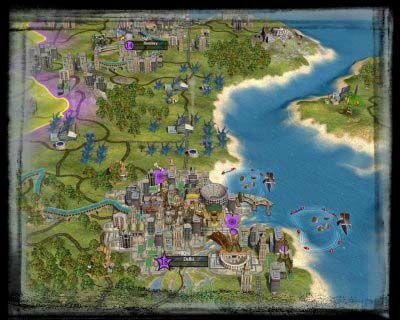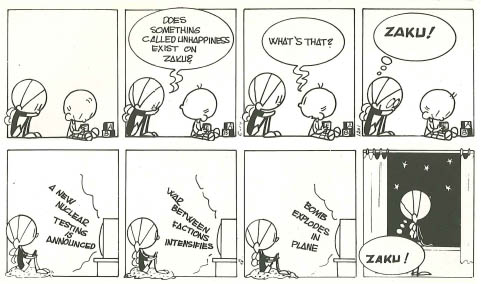(Pek belli olmasa da, bu Iain M. Banks’in Culture’ı üzerine bir yazıdır, lütfen feedreader‘ınızın ayarlarıyla oynamayınız..)
 Civilization’da hedeflerden birine ulaşılıp da, akabinde oyun bittikten sonra acaba kaçımız gelen teklifi değerlendirip, oynamaya devam eder? Ya da, daha doğrusu neden devam edilmez? Bugün, Banks’in 1994’te Culture üzerine yazdığı bir makaleyi okurken kendimi bunu düşünürken buldum — daha doğrusu, savaşın olmadığı, her medeniyetin diğer medeniyetlerin saldırısına / toprak çalmasına / casus göndermesine karşı önlem alma gereği duymadığı, tamamıyla ütopik bir mod‘u tasarlamaya çalıştım.
Civilization’da hedeflerden birine ulaşılıp da, akabinde oyun bittikten sonra acaba kaçımız gelen teklifi değerlendirip, oynamaya devam eder? Ya da, daha doğrusu neden devam edilmez? Bugün, Banks’in 1994’te Culture üzerine yazdığı bir makaleyi okurken kendimi bunu düşünürken buldum — daha doğrusu, savaşın olmadığı, her medeniyetin diğer medeniyetlerin saldırısına / toprak çalmasına / casus göndermesine karşı önlem alma gereği duymadığı, tamamıyla ütopik bir mod‘u tasarlamaya çalıştım.
Uzunca bir süredir mevcut olan lakin pek kullanmadığım bir blog kategorim var “Ütopya/distopya” başlıklı. Hatta, üşenmedim, gittim baktım, hepi topu 3 adet girişi bu kategoriye dahil etmişim ve bunların da ikisini hikayeler oluşturmakta. Culture serisinden şimdilik 3 kitap okumuş durumdayım (Consider Phlebas / Player of Games / Use of Weapons) fakat arzu ettiğim ütopyanın ta kendisi oluverdi. Benim hayalimdeki cennet, yazılmış bütün kitapları barındıran (yanında filmler de olsa iyi olurdu) devasa bir kütüphane olagelmiştir (ve lütfen nargile ve puro başta olmak üzere envai çeşit tütün ürünü – ah tabii ki ölümsüzlük de cabası, zaten cennet dedim dikkat ederseniz!). Böyle bir hayatı sürmek için Culture evreni de hiç fena değil. Kaç haftadır şöyle bir özet geçeyim istiyordum ama zaten sağolsun Banks yukarıda anılan makalede güzel güzel özetlemiş:
Uzunca bir alıntı oldu, değil mi? Geldiği yerde daha da uzunu var ama, halimize şükretmeliyiz… Hem okumak zorunda da değilsiniz, ben bile sadece bugün okuduğumla yetindim, şimdi alıntılarken bir daha okumayıp, kopya/pasta kardeşlerin hünerli ellerine bıraktım kendimi. Hoş olan, Banks’in yukarıda bahsettiğim makalesinde, Culture evreninin gerçekleşme olasılığını tartışırken, “insanların birbirlerini yok etmediği varsayımında bulunduğu” şerhini koyması. Bu konuyu açacak olursak:
Daha evvelden de belirtmiş idim, öncelikli olarak çevirmek istediğim kitap (ki kitap çevireceğimden değil, lakin bir gün çevirecek olursam, zaten topu topu iki kitap var çevirmek istediğim) Robert Michels’in On Political Parties ‘idir (diğeri de Murakami’nin Wind-Up Bird Chronicles‘ı zaten). İşte o kitapta Robert Michels, saygı duyduğum bir saptamada bulunur: Oligarşinin Demir Yasası. Nedir bu yasa:
ya da Türkçe söyleyecek olursak:
Bir ütopya kurmaya kalkışacak olursanız, başınızı en çok ağrıtmaya aday olan bu (çok gerçekçi) yasanın çaresine Culture evreninde, bu en skeptik ve hahacı naçiz yours truly‘yi bile neredeyse ikna edecek bir şekilde bakılıyor (Nasıl bakıldığını soracak olursanız, açın kitapları okuyun derim – HAHA!) (E tabii ki teknolojiden faydalanılarak, ne sandıydınız?!) (Kaldı ki, daha ortalarda teknolojinin T’si yokken bile Aristo Efendi olayı çözmüştü köleler vasıtası ile – yukarıdaki uzuuun Banks alıntısını okumamışsınızdır nasıl olsa, bari o alıntıdan bir alıntı yapayım:
ve bakınız, parantezi kapatmayı unutmuyorum! HAHA! HAHAHA!) (Teknolojinin olayı köleliğe ne gözle baktığınızla orantılı. Sonuçta o kadar lafı geçen Aristo Efendi’nin asıl yüzü ortadır… Efendim? İlim irfan mı dediniz? Taşın yere ondan yapıldığı ve kavuşmak istediği için düştüğünü söyleyen bir adamdan bahsettiğimizi hatırlatmak isterim -yine de az evvel Aristo’nun Fizik‘ini taradım, bu savı öne sürdüğü kısmı bulamadım… Turan?-)
LeGuin ile Rowling’in isimlerinin birlikte geçtiği bir cümle şöyle demekteydi (Nicholas Lezard adında biri demiş, hakkını yemeyeyim):
‘Rowling can type, but Le Guin can write.’ (ilgilenen olursa, bu meseleye şu girişte değinmiş idim)
Banks de hakikaten iyi edebiyatçı. Şimdi karşı çıkanlarınız olacaktır elbet ama nasıl ki Sartre (Kiklops), varoluşçuluğunu gayet iyi bir şekilde kafa ütüleyen felsefe kitapları ile değil de (/yanısıra) hakikaten iyi yazılmış romanlarıyla anlatıyordu, Banks de Culture’ını olay örgüsü sağlam ve olduğu zaman tam duygusal olmayı becerebilen romanlarıyla anlatıyor. Balveda, Fal N’geestra, Diziet Sma bunlar kanlı canlı karakterlerdi. Sadece karakterler değil, iyi bir bilimkurgu romanının olmazsa olmazı diye tabir edeceğim “O dünyayı anlatırken aslında bu dünyayı anlatıyor olması” olgusu ise hele de Player of Games‘de tavan yapıyor (henüz Inversions‘ı okumadım). Alın hemen size bir kuple Player of Games’den – “kahramanımız”, ziyarete gittiği (quote)yabancı(unquote) gezegen hakkında bilgilendirilmektedir:
bu da güzeldi – “kahramanımız”, ziyarete gittiği (quote)yabancı(unquote) gezegende bir baloya katılmıştır:
Banks bunları anlatırken, arka planda okuyucuya küçük sürprizler ve yan hikayeler de sunar. İlk kitabın (Horza’yı konu edinen) son 20 sayfasında şoka uğramıştım (evet, bu küçük olarak tanımlanamaz sanırım), kaldı ki, tak diye sonundaki ansiklopedik bilgi de zihin açıcıydı. İkinci kitap.. ahh ahh… orada bir Trinev Dutleysdaughter meselesi vardır ki, gerçekten çok zerafet katar romana — birkaç satır sürse bile… Use of Weapons, başlı başına bir girişi hak ediyor, bugün State of the Art‘a başlar gibi yaptım, onu bitirirsem, Use of Weapons‘da roman rakamlı bölümleri okuyacağım tekrar ama bu sefer kronolojik sırasıyla.
Gelelim bugünkü “bunları biliyor musunuz?” köşemize: bu uzuuuun girişi aslında 4. kez yazdığımı, ilk 3 seferde aptalca hatalar sonucu yazdığım bütün kısımları heder olduğunu biliyor musunuz? Ben biliyorum. Hele en son gidişte iyice kopup, vazgeçmiştim yazmaktan ki, bir şekilde Banks’in makalesini alıntıladıktan sonra kaydetmişim, onun yüzü suyu hürmetine tekrardan yazabildim. Saat olmuş geceyarısı, halbuki bir giriş de Black Books nezdinde dizilerle ilgili yapacaktım… kaldı yarına…


 Civilization’da hedeflerden birine ulaşılıp da, akabinde oyun bittikten sonra acaba kaçımız gelen teklifi değerlendirip, oynamaya devam eder? Ya da, daha doğrusu neden devam edilmez? Bugün, Banks’in 1994’te Culture üzerine yazdığı bir
Civilization’da hedeflerden birine ulaşılıp da, akabinde oyun bittikten sonra acaba kaçımız gelen teklifi değerlendirip, oynamaya devam eder? Ya da, daha doğrusu neden devam edilmez? Bugün, Banks’in 1994’te Culture üzerine yazdığı bir